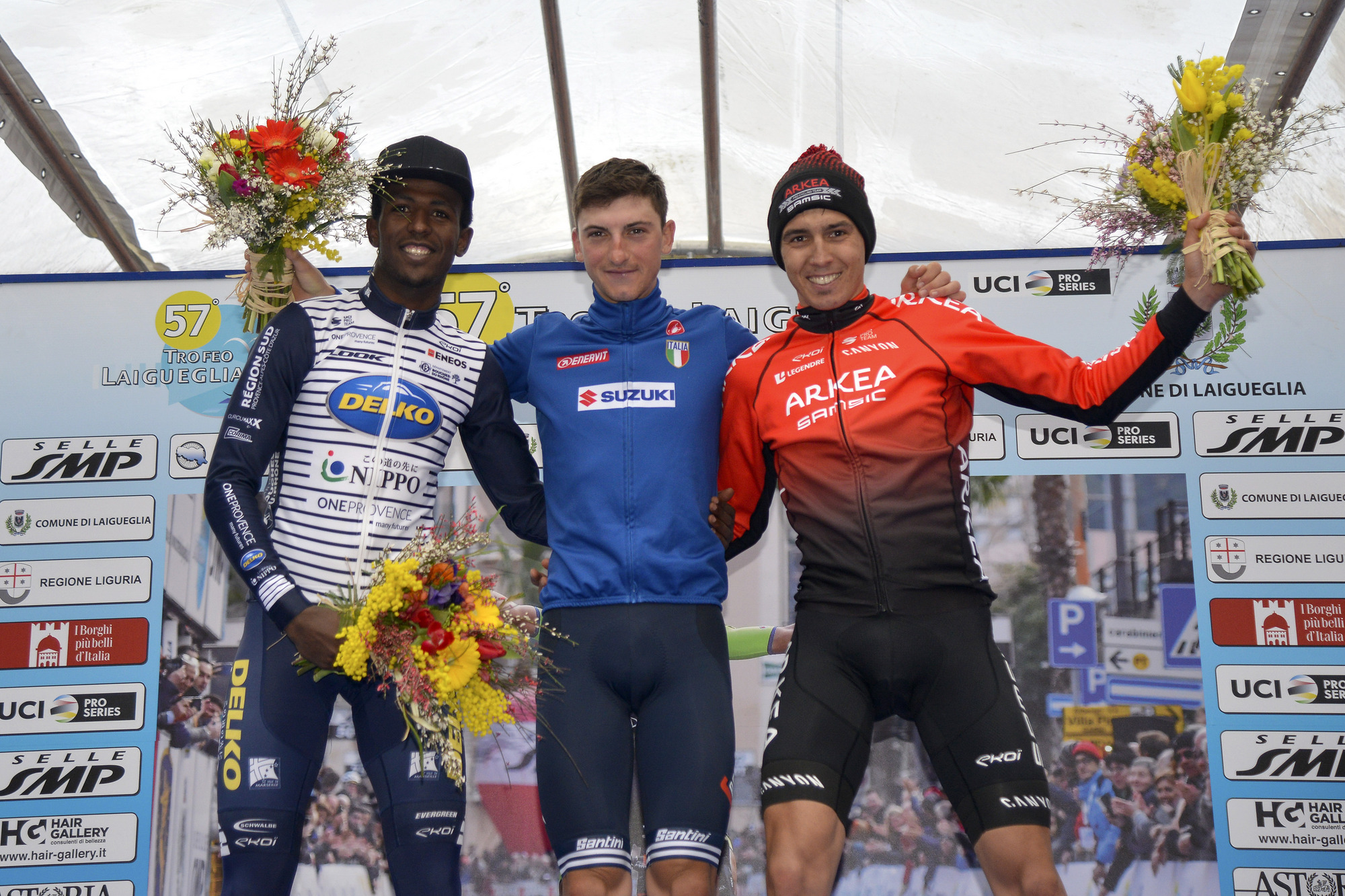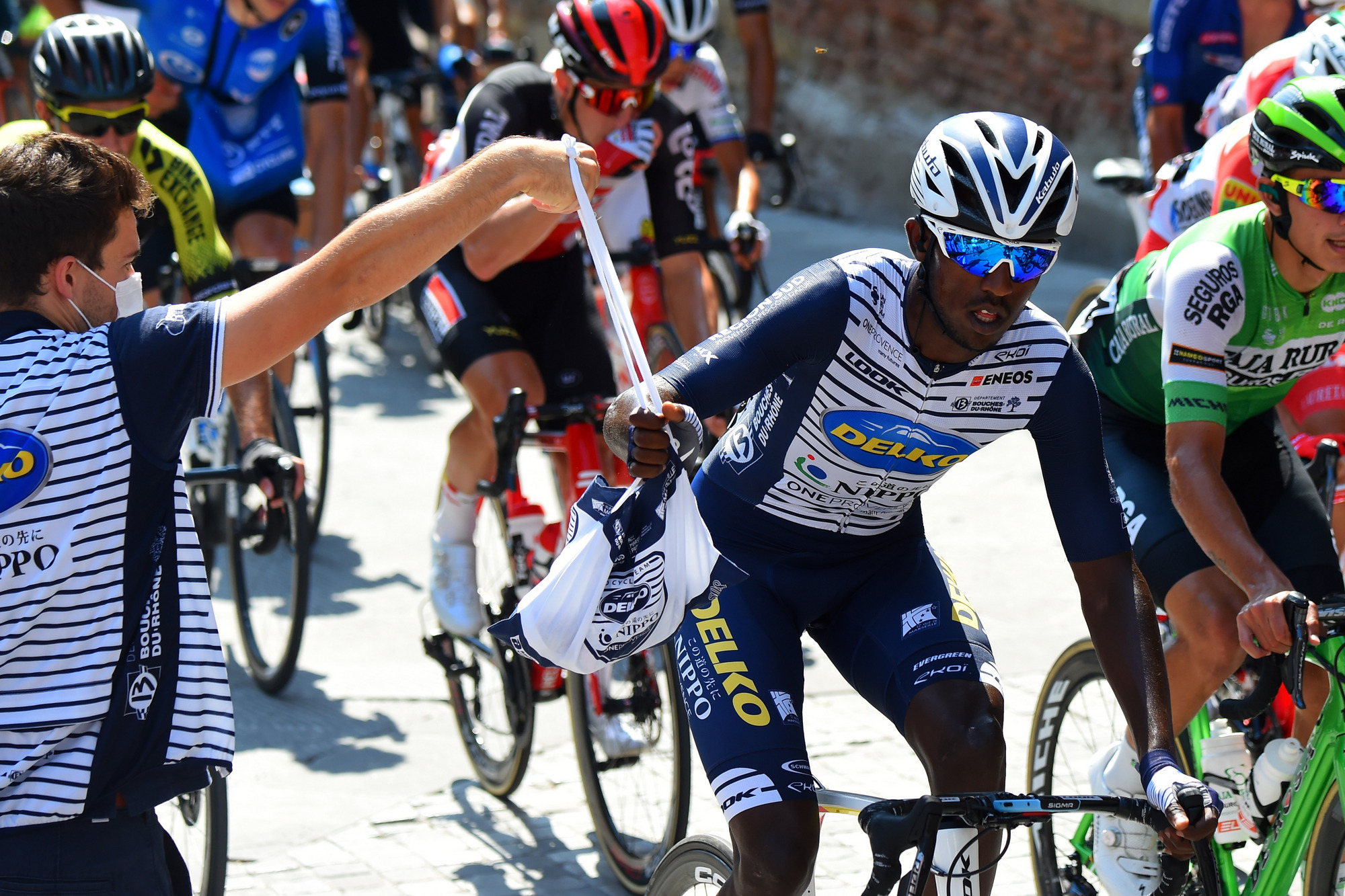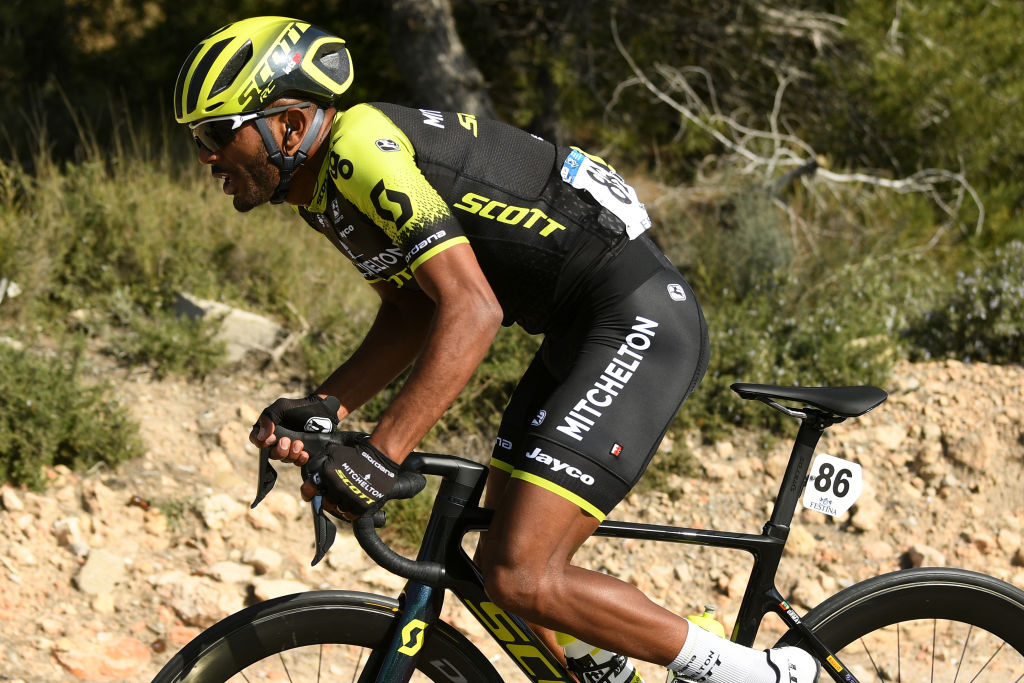Transfer Mechanics: The struggles facing African riders trying to break into the WorldTour
Robbie Hunter: African riders aren't being given a chance

This spring, rider agent Robbie Hunter sent an email to around 30 of the most influential team managers, coaches, and directors in the sport. The subject of the correspondence was to draw attention to the lack of African - and especially black African - riders in the peloton.
Despite coming in the wake of the rise of the Black Lives Matter movement and the related topics that were brought to everyone's consciousness as a result, only a handful of responses came back.
In September, Hunter tried once more, again contacting the great and good of cycling's highest echelons, and this time only Cofidis, Rally, Sunweb, Vincent Lavenu from AG2R La Mondiale, and Circus-Wanty replied.
From everyone else, the silence was telling but hardly a surprise.
The lack of representation of BAME [Black, Asian and minority ethnic - ed] riders in professional cycling is, sadly, nothing new. At the Tour de France, for instance, the sole black rider in the peloton was Kévin Reza, while only a handful of WorldTour teams can claim to have signed riders from BAME or African backgrounds in recent years. In fact, out of 542 men's WorldTour riders, only 11 are from Africa, and only four of those, according to Fuoriclasse, come from outside of South Africa.
The issues behind the lack of diversity when it comes to promoting African riders are complex, to say the least, with visas, immigration, language barriers, and cultural preconceptions all at play. However, at the core of the matter is the simple truth that African riders - and specifically Black African riders - have to work twice as hard as Europeans to earn WorldTour contracts, even if their results are just as good, if not better.
The fault of that doesn't just land at the feet of the teams - they cannot create visas out of thin air - but there are genuine trends that suggest squads can do more.
Get The Leadout Newsletter
The latest race content, interviews, features, reviews and expert buying guides, direct to your inbox!
"There are some teams that have African athletes. Mitchelton and Trek have had them in the past but the crazy part is that the African riders have to do so much more in order to even be looked at when compared to their European counterparts," Hunter tells Cyclingnews.
"That to me is so disappointing because you'll get a young Eritrean rider who outperforms professional riders at the age of 19 and people question if they even want to look at him. Then, at the same time, an Italian rider will do similar results and he'll have a four-year contract almost immediately. I don't get it."
Hunter points to one rider he represents in particular, Biniam Ghirmay, who at the age of 19 was getting noticeable results in Europe and in Africa. However, there was virtually no interest from WorldTour teams and, in the end, the second division French team Nippo Delko One Provence offered Ghirmay a multiple-year deal.
"So Biniam Ghirmay, when he was racing as a junior with Remco Evenepoel was one of two people who beat Remco but no one wanted to take him as an athlete. The only team that wanted to take him at the time was Delko," Hunter says.
"Now he gets second in Laigueglia and all of a sudden teams are saying 'I remember you mentioned him last year. He looks quite good'. Then on the other hand if you have a European rider with the same results there's no question about signing him up."

Ghirmay isn't the exception. Take Henok Mulubrhan as another example. The 20-year-old currently rides from the NTT Development Team and finished in the top 12 in both the Tour du Rwanda and La Tropicale Amissa Bongo in 2019. He made the top 10 in both races this year and then backed that up with 11th in the Baby Giro in August. The amount of WorldTour contracts in his inbox? Zero.
"He finishes in the first group in Appennino but he's passed over," Hunter says.
"I'm not saying that he or other African riders should be given special treatment but if we're talking about results then why not consider the athlete? You can't tell me that Mulubrhan doesn't have the quality to be a professional.
"At the end of the day, you can come with data that shows that the African riders are doing more and that they're physically more capable but teams aren't prepared to give them a chance," Hunter continues.
"I know that some of these riders are not coming from nations that have massive cycling backgrounds but if you look at Eritrea, their number one sport is cycling. It's just that these riders come out of different cycling cultures. They know how to race, they have the ability, they just need to adjust to Europe but they're not given that chance."
It's true that a small number of African riders have been given chances. Tsgabu Grmay has ridden for four different WorldTour teams and established himself as one of the most dependable climbing domestiques in the peloton. Merhawi Kudus has another year on his current deal at Astana, Natnael Berhane is currently plying his trade in France with Cofidis, and Nic Dlamini is in his third season at WorldTour level with NTT.
There are riders from Africa who haven't been as successful, and while that's true of any collection of riders if you break them down by geography, Hunter's point is that riders from Africa are simply not being given a fair chance.
Culture
Dimension Data, formerly MTN-Qhubeka, was once seen as the bastion of African cycling. They created a gateway for African riders to travel and have a chance in the European peloton but, with their exit from the WorldTour almost certain at the end of 2020, Hunter fears for what might come next and whether or not other teams are ready or even willing to pick up the baton and champion African cycling.
It's true that, from a teams' perspective, hiring riders from Africa isn't often easy. Visas can be problematic and create hurdles for athletes who lack a place of residence in Europe and need to travel around the continent. One team manager we spoke to told us of an Eritrean who signed a two-year deal with his team and after the first season, he returned back to Eritrea for the winter. By the time the rider was able to have his visa ratified it was June the following season. However, there are other issues at hand, along with the bureaucratic red tape.
Language is often raised as a sticking point but small numbers of riders from Asia, and more prominently South America, have shown that such a hurdle can be overcome. A big issue, it seems, for teams and managers, is the cultural difference. For example, when Hunter came over to Europe in the 1990s to race his bike, he was often asked 'what's an African doing riding a bicycle?'
Xylon van Eyck is a communications expert from South Africa who has worked with pro teams in the men's and women's peloton in Europe. He has also worked with teams and riders from Africa for over a decade and has seen first hand the realities facing want-to-be athletes hoping to travel from Africa to Europe.
"If you want to sign a rider from Africa then you need to have the appetite because as a team it takes the next level of commitment," he says.
"There's the visa process and you need to understand it and be on top of it. The riders definitely need support. Over time I think riders have needed to do more of the work themselves but from a passport point of view it's easier to sign a European but riders like Grmay have shown that you can get a return on investment.
"I don't want to say prejudice or racism but there is a lack of understanding around a culture you've never been exposed to as well as the language barrier. It's not easy to communicate with some of the guys when English isn't their first language but that isn't to say the guys won't adapt like any other cyclist who doesn't have English as a first language. You just need a bit of patience. It's not that the talent or raw passion isn't there from the riders. I think that there are 20 more Ghirmays ready to be spotted, helped, and developed. It does take a little more effort but not more than a rider from, say, Colombia."

Hunter agrees that visas can provide a hurdle. However, he also believes that the way in which teams and managers see African riders is also part of the problem and that cultural perceptions around them are just as much of an issue.
"Yes, there are visa issues but it's not an impossible task. If it was impossible you'd not have Grmay, Kudus, or some of the other African riders here. And this isn't just a new issue related to teams struggling due to financial pressures related to COVID; this is entirely down to African riders not being given a chance.
"Firstly, I think that it's down to a cultural thing. You're taking guys who don't speak English but neither did a lot of Colombians at first. But if you take someone like Tsgabu Grmay, he's a great professional and he's adapted really well with whatever group you put him in. He knew no English when he first came to Europe."
The French squad Delko, as previously mentioned, have taken strides to offer riders from Africa the chance to race in Europe. Their team boss Philippe Lannes sees Africa as an opportunity to find riders of potential but he acknowledged that, from his experience, riders from Africa sometimes need longer to settle in the European peloton. He also raised the point that, although riders from African nations might have talent, scouting them is not an easy process because channels for such things are not as developed as they are in Europe.
"Africa has a population of 1.2 billion people with a very young population so proportionally many athletes are capable of shining in sports such as cycling," Philippe Lannes says.
"In Africa, some countries have a strong cycling culture such as Eritrea or Rwanda, and are very structured so I think there is great potential. Others, however, are not at all, like Ethiopia. For example, the federation does not participate in the African Championships every year because it does not have the means to bring riders to the championships. There are countries where there are talented riders but they are not detectable. Mulu Kinfe Hailemichael, our Ethiopian rider, was fortunate to be detected because he finished third and best climber of the Tour of Rwanda which allowed him to be recruited by a continental team.
"For the riders, it often takes two years before they manage to make up for the missing technical side. This is an essential element to take into account in recruitment, the intellectual capacity to adapt."
Delko realise that their responsibility doesn't just begin and end with signing riders. Once an athlete makes the move from Africa to Europe, Lannes understands that cultural differences needed to be appreciated and that supporting riders is imperative.
"Today, a 20-year-old African who has often lived with all his family, many friends and interconnections with groups, cannot be isolated for several months with the sole directive to ride a bike. So it is necessary to build around them a semblance of a family unit and to pay them a lot of attention. The important thing is to put them in a relational circle so that they do not find themselves alone. If they are alone, this has a direct impact on their morale and an indirect impact on their performance.
"I have rented a big house not far from my village where the African riders live together. Between the team members, my acquaintances, and my family, we mobilize to create a bond and take care of them so that they are immersed in social life."
Race
The question of whether the colour of a person's skin - and not just his or her passport - has any relevance when providing opportunities for riders is a question that few in cycling are prepared to face up to.
Hunter says that he's never seen racism first hand against any of the riders that he manages, although he has been made aware of it happening through third parties. He finds it hard to believe that black African riders are treated in the same way other African riders are.
"I've never had a racist incident with a team manager but at the end of the day colour has to be a factor because some do think that black people don't race bikes," he says.
"From that perspective, it's a colour thing because there's still a culture that says Africans must be good at running and Europeans are better at cycling. The young guys I represent, some of them could do another year at U23 but they're all capable of turning professional. I have to tell my guys that if they were French or Italian I would already have two contracts for you."
From his experience with contract negotiations, Hunter has seen that talks always take longer when it comes to black riders.
"There's always a much longer and much more intense negotiation when you're talking to a team about a black African rider. That's a fact. I tell the riders that they're being discriminated against because that's the truth.
"It's definitely a lot harder for black Africans than it is for white Africans and I can pinpoint 50 riders from Europe who haven't won races as pros or as amateurs but still have pro contracts. An African rider could do exactly the same job as a lot of those guys, and I'm sure actually do a better job because they're a thousand times more hungry to succeed."
Hunter's experience in trying to provide opportunities for African riders once again highlights the discussions of race and colour within the sport and society as a whole. There are no instant solutions but examples such as Delko and the hard work put in by other individuals and parties demonstrate that riders from Africa have everything it takes to make it in the WorldTour if their gateways to opportunities are improved.
Daniel Benson was the Editor in Chief at Cyclingnews.com between 2008 and 2022. Based in the UK, he joined the Cyclingnews team in 2008 as the site's first UK-based Managing Editor. In that time, he reported on over a dozen editions of the Tour de France, several World Championships, the Tour Down Under, Spring Classics, and the London 2012 Olympic Games. With the help of the excellent editorial team, he ran the coverage on Cyclingnews and has interviewed leading figures in the sport including UCI Presidents and Tour de France winners.
